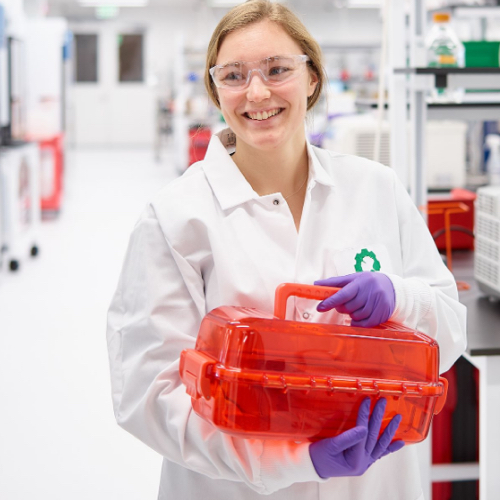Selecta Biosciences intends to use Ginkgo’s cell programming platform to develop next-gen gene therapies using AAV capsids.
Gene therapy is one of the newest wave of treatments for many rare or orphaned diseases. However, current methods often result in unwanted immune responses.
What if you could grow the newest generation of therapies for human disease?
Together with Selecta Biosciences, Ginkgo is launching a collaboration to develop safer and more effective next-generation gene therapy adeno-associated viral capsids. Adeno-associated viruses (AAVs) are a type of gene delivery vector system. But several obstacles, including how these viruses interact with the immune system (immunogenicity), how well they can get into the cells (tropism), and how well they get DNA into the cells’ genomes (transduction efficiency), must still be overcome before fully realizing the AAV vector systems for many patient treatments. There are many types of AAVs, and they each work differently in different tissues, partially because of variations in the capsid–the protein coat of the virus.
The partnership with Selecta leverages the unique platforms of both companies as we seek to develop next-generation viral capsids with improved transduction, enhanced tissue tropism, and reduced immunogenicity. Ginkgo plans to design and engineer the capsids, and Selecta will conduct all pre-clinical and clinical studies thereafter.
“We are excited to continue our partnership with Ginkgo in a second collaboration that leverages Ginkgo’s leading cell engineering platform to design viral vector capsids with the goal of improved transduction, enhanced tissue tropism and reduced immunogenicity” said Carsten Brunn, CEO of Selecta Biosciences. “By combining ImmTOR with next-generation, fit-for-purpose AAV vectors, we hope to further improve the safety and efficacy of AAV-mediated gene therapies.”
Under the terms of the collaboration, Ginkgo is eligible to earn upfront research and development fees and milestone payments, including certain milestone payments in the form of Selecta common stock. In addition, Ginkgo is eligible to earn clinical, regulatory and commercial milestone payments of up to $200 million in cash for each of a specified number of products, which have the potential to total, in the aggregate, up to $1.1 billion. Ginkgo is also entitled to potential further downstream value in the form of royalties on sales.
Jason Kelly, CEO of Ginkgo, added, “Gene therapies utilize naturally occurring viral capsids that elicit immune responses and often exhibit safety and toxicity issues. We believe our collaboration with Selecta has the potential to confront major challenges within the gene therapy space and represents an important application of our cell programming platform. We look forward to executing on our shared vision and offering a potential solution for challenges in gene therapies that prevent treatment for millions of patients.”
Read the full press release here.
